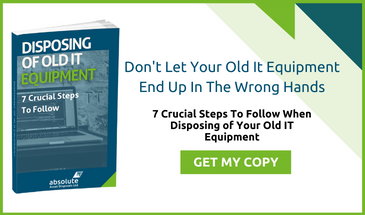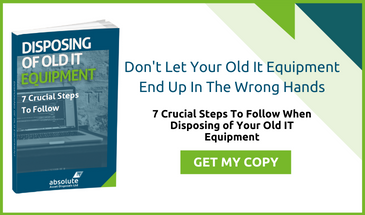
Developing a sound asset disposal strategy delivers more benefits than simply dictating how to dispose of an asset. It reflects organised and thoughtful management as well as controlling several aspects surrounding end of life equipment, such as:
- Compliance with data security regulations
- Compliance with environmental control regulations
- Maintaining continuity of asset tracking for good governance
- Implementing a process for staff to understand and follow
- Awareness of the lifecycle status of equipment and when to dispose
Compliance - Data
Regulations surrounding data security and confidentiality have grown more stringent in recent years. In parallel, the frequency of breaches seems to have grown apace. Whether caused by hostile actions by hackers, or carelessness on behalf of a company or its employees, these occurrences make headline news and reflect badly on the organisation at fault.
The cost of non-compliance has become alarmingly significant also. Up to €20 million or 4% of annual global turnover, whichever is the highest. While these penalties do have the benefit of forcing companies to focus on compliance, they also represent a financial risk to organisations that handle customer data. It seems that they would only be levied in a worst case scenario for companies that ignore or fail to take action on repeated warnings from the authorities, but they are a risk nevertheless.
Compliance - Environmental
The Waste Electrical and Electronic Equipment (WEEE) Regulations represent an initiative to minimise damage to the environment by reducing the volume of waste being sent to landfill. Producers (manufacturers or suppliers) are responsible for the end of life recycling of their products and for achieving stated targets for collecting, recycling and safe disposal of those assets.
Your Strategy
An asset disposal strategy is very likely to tie in with a company’s asset register. The disposal process needs to be informed of assets that are approaching end of life. The strategy may dictate different actions for specific types of equipment and at different ages or phases of their life. For example, recycling through reuse or repurposing may be preferable for user devices such as desktops, laptops, tablets and phones. By contrast, network infrastructure equipment such as firewalls or load balancers may be deemed suitable for disposal only.
A critical section of the strategy will be the actual disposal process. Whether the company chooses to carry out the bulk of activities itself or prefers to engage a third party partner, due diligence is vital to ensure that all regulations will be fully complied with in a thoroughly accountable, transparent and documented manner. The result should be rock solid certification that an asset has been disposed of correctly so that any audit or investigation cannot be anything other than completely satisfied.
Benefits Of Engaging A Professional Disposal Partner
We at Absolute IT Asset Disposal have been engaged in professional asset disposal for large and medium sized companies since 2003. Our people are cleared to SC level and our processes adhere to, or exceed, all regulatory and best practice standards and recommendations.
This means that you are guaranteed to have a fully compliant process on your side, with complete and thorough data sanitisation as well as environmentally friendly disposal. In fact, we target 0% sent to landfill with practically everything being recycled.
Next Steps
Contact us today to discuss your organisation’s needs and plans. We can quickly advise you on where we can dovetail with your processes and fulfil your asset disposal requirements in a fully compliant manner.











